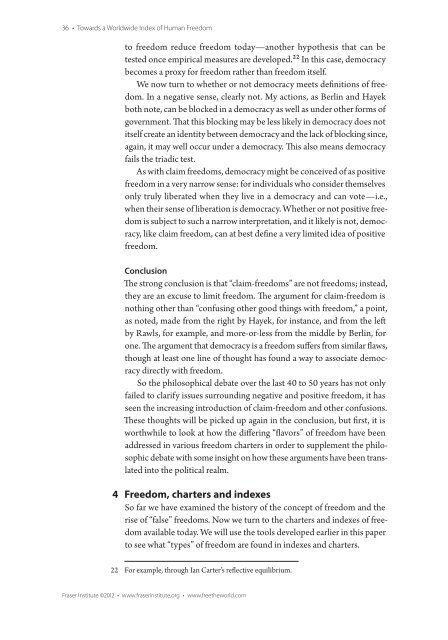Towards a Worldwide Index of Human Freedom
Towards a Worldwide Index of Human Freedom
Towards a Worldwide Index of Human Freedom
Create successful ePaper yourself
Turn your PDF publications into a flip-book with our unique Google optimized e-Paper software.
36 • <strong>Towards</strong> a <strong>Worldwide</strong> <strong>Index</strong> <strong>of</strong> <strong>Human</strong> <strong>Freedom</strong><br />
to freedom reduce freedom today—another hypothesis that can be<br />
tested once empirical measures are developed.22 In this case, democracy<br />
becomes a proxy for freedom rather than freedom itself.<br />
We now turn to whether or not democracy meets definitions <strong>of</strong> freedom.<br />
In a negative sense, clearly not. My actions, as Berlin and Hayek<br />
both note, can be blocked in a democracy as well as under other forms <strong>of</strong><br />
government. That this blocking may be less likely in democracy does not<br />
itself create an identity between democracy and the lack <strong>of</strong> blocking since,<br />
again, it may well occur under a democracy. This also means democracy<br />
fails the triadic test.<br />
As with claim freedoms, democracy might be conceived <strong>of</strong> as positive<br />
freedom in a very narrow sense: for individuals who consider themselves<br />
only truly liberated when they live in a democracy and can vote—i.e.,<br />
when their sense <strong>of</strong> liberation is democracy. Whether or not positive freedom<br />
is subject to such a narrow interpretation, and it likely is not, democracy,<br />
like claim freedom, can at best define a very limited idea <strong>of</strong> positive<br />
freedom.<br />
Conclusion<br />
The strong conclusion is that “claim-freedoms” are not freedoms; instead,<br />
they are an excuse to limit freedom. The argument for claim-freedom is<br />
nothing other than “confusing other good things with freedom,” a point,<br />
as noted, made from the right by Hayek, for instance, and from the left<br />
by Rawls, for example, and more-or-less from the middle by Berlin, for<br />
one. The argument that democracy is a freedom suffers from similar flaws,<br />
though at least one line <strong>of</strong> thought has found a way to associate democracy<br />
directly with freedom.<br />
So the philosophical debate over the last 40 to 50 years has not only<br />
failed to clarify issues surrounding negative and positive freedom, it has<br />
seen the increasing introduction <strong>of</strong> claim-freedom and other confusions.<br />
These thoughts will be picked up again in the conclusion, but first, it is<br />
worthwhile to look at how the differing “flavors” <strong>of</strong> freedom have been<br />
addressed in various freedom charters in order to supplement the philosophic<br />
debate with some insight on how these arguments have been translated<br />
into the political realm.<br />
4 <strong>Freedom</strong>, charters and indexes<br />
So far we have examined the history <strong>of</strong> the concept <strong>of</strong> freedom and the<br />
rise <strong>of</strong> “false” freedoms. Now we turn to the charters and indexes <strong>of</strong> freedom<br />
available today. We will use the tools developed earlier in this paper<br />
to see what “types” <strong>of</strong> freedom are found in indexes and charters.<br />
22 For example, through Ian Carter’s reflective equilibrium.<br />
Fraser Institute ©2012 • www.fraserinstitute.org • www.freetheworld.com


